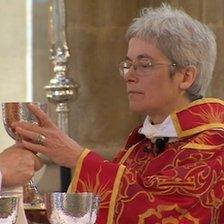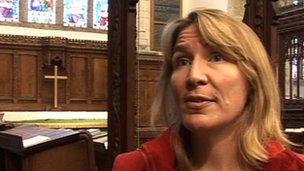Women bishops: Church of England General Synod to vote
- Published

Frances Ward was one of the first women to be ordained as a priest
The Church of England General Synod is to meet on Tuesday to vote on whether to allow women to become bishops.
The outgoing Archbishop of Canterbury and his successor, the Right Reverend Justin Welby, support the move.
A majority of Church members are also in favour, but strong opposition from traditionalists and a complicated votes system mean the outcome is uncertain.
A prayer vigil open to both those in favour and against women bishops has taken place at Westminster Abbey.
Dr Jane Hedges, canon steward of Westminster Abbey, acknowledged the strength of the arguments on both sides of the debate.
She said the vote was a "really important moment in the life of the Church - we are very concerned at the abbey to welcome everybody.
"I hope and pray that it will go through tomorrow but I understand that it is difficult for everybody."
The vote comes 20 years after the Church decided to ordain women as priests.
Women now make up about a third of all clergy.
The meeting of the Synod, which is the Church of England's governing body, will be held at Church House, in London.
A series of votes will be held in what is being seen as the first major test for the next Archbishop of Canterbury, the Right Reverend Justin Welby, who is currently the Bishop of Durham.
He is expected to speak in Tuesday's debate, urging the Synod to support the change.
Among the initial group of women to be ordained in 1994 was Frances Ward, who is now Dean of St Edmundsbury Cathedral and one of the most senior women in the Church of England. She is impatient for change.
"The time now is right and we really do need to take this step. Our credibility will be shot through if we don't pass this on Tuesday," she said.
The Church of England has been at this stage before.
The crux of the dispute involves arrangements to be made when a female bishop is appointed but traditionalist parishes reject her authority.
The Church was due to vote on the change in July, but the discussion was adjourned without a vote after supporters of women bishops objected to a concession proposed for opponents.
They objected to an amendment to the draft law allowing parishes who do not accept women bishops to request a male bishop who shares their beliefs.
'Not fit for purpose'
A new amendment has now been drawn up, conceived by the Reverend Janet Appleby, a vicar from Tyne and Wear.
Christina Rees, General Synod: "The are no more words... it's make up our minds time"
It says male bishops should be selected in a manner that "respects" the reasons the parish asked for him in the first place. How that would work in practice will be defined when the Church's code of practice is written up following the vote.
The new amendment has received qualified backing from supporters of women bishops, but has been described as "not fit for purpose" by opponents.
Opposition groups, a coalition of traditionalists, evangelicals and Catholics within the Church, have sent a booklet to all 468 members of the Synod arguing the draft measure falls short of what they need.
In a letter to the Times, external on Friday signed by 327 clergy from all but one of the Church's 44 diocese, they said the draft measure would "severely prejudice" their future ministries, and its approval would "lead irrevocably to deep fractures appearing within the Church".

Susie Leafe believes leadership of the Church should be taken by men
But more than 1,000 Church members, including bishops, clergy and senior laity, have signed an open letter - published in the Independent, external - urging the Synod to vote in favour of women bishops.
The letter says: "Just as the Churches have repented of our historic anti-Semitism and endorsement of slavery, so we believe that we must now show clearly that we no longer believe women to be inferior to men."
One Synod member who is set to vote against the measure is Susie Leafe. A member of the Reform evangelical movement within the Church, she says her objections are simple.
"I believe that God created men and women equal, but I also believe He created us different and that we've got different roles to play. And that the ultimate leadership of the family - and the church which is the family of God - should be taken by men," she said.
Major test
To pass the change, supporters need to get two-thirds majorities in all three houses of the General Synod. The measure is expected to be comfortably passed in both the House of Bishops and the House of Clergy.
But the vote in the House of Laity is said to be on a knife-edge.
If the measure is approved, the legislation will go to the Houses of Parliament before receiving Royal Assent, paving the way for the first women bishops in 2014.
However, if it is defeated, the proposal would be killed for at least seven years.
And it would lead to questions about the next Archbishop of Canterbury's leadership and leave him taking over a divided church.
Such a move would also be a blow to the outgoing Archbishop Rowan Williams. He has warned of turmoil in the Church if the change is voted down.